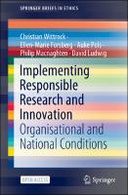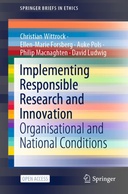Explore

Implementing Responsible Research and Innovation: Organisational and National Conditions
This book examines conditions for the uptake of responsible research and innovation (RRI): in Part I, we examine how organisational dynamics act as barriers and drivers, while in Part II, we explore the formative role of national discourses and practices. RRI is analysed both in the form of five policy keys—research ethics, gender equality, science education, public engagement in science, and open access in scientific publications—and as a set of process dimensions, that research and innovation needs to be diverse and inclusive, anticipative and reflective, open and transparent, and responsive and adaptive to change. The book focuses chiefly on the ‘research’ component of the RRI concept. The book is grounded in research conveyed in 12 national reports undertaken as part of the RRI-Practice project, covering 23 research conducting and funding organisations both in Europe (Bulgaria, France, Germany, Italy, the Netherlands, Norway, and the UK) and beyond (Australia, Brazil, China, India, and the US). Each national report was written to describe the drivers, barriers and good practices identified with each aspect of the RRI concept, as well as relevant legal conditions and characteristics of national cultures that were seen to affect RRI implementation. The reports also contain plans on how to develop RRI implementation in each of the included organisations, often with suggestions for the development of indicators that could monitor implementation efforts. In this book, we present a comparative analysis of the 12 national reports, with a specific focus on organisational perspectives in Part I, and on how national policy structures and culture affect RRI implementation in Part II. In Chap. 1, we describe the book and the study on which it is based. Part I comprises Chaps. 2–5. Chapter 2 details the methodology not only for the organisational analysis, but also for the RRI-Practice project in general. In Chaps. 3 and 4, we survey drivers and barriers to the implementation of RRI in organisations. Using an analytic framework derived from neo-institutional theory, drivers and barriers are categorised as either structural, cultural or interchange related. In Chap. 5, we discuss salient findings for developing RRI in research conducting and funding organisations.
This book is included in DOAB.
Why read this book? Have your say.
You must be logged in to comment.
Links
DOI: 10.1007/978-3-030-54286-3web: https://link.springer.com/book/10.1007/978-3-030-54286-3
Editions


